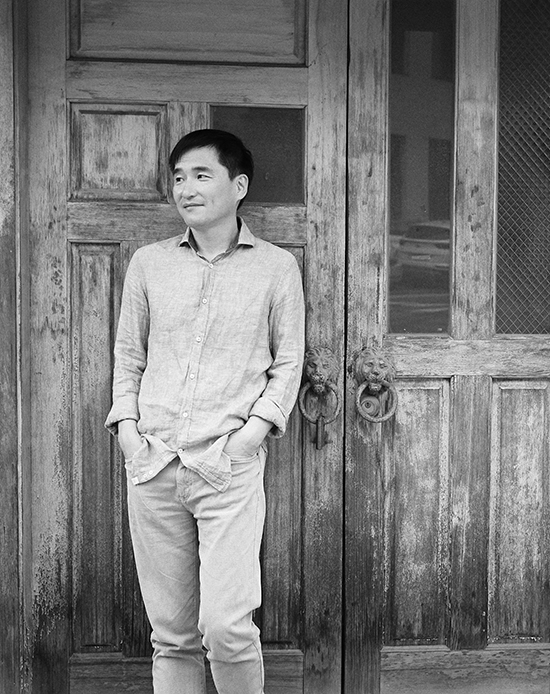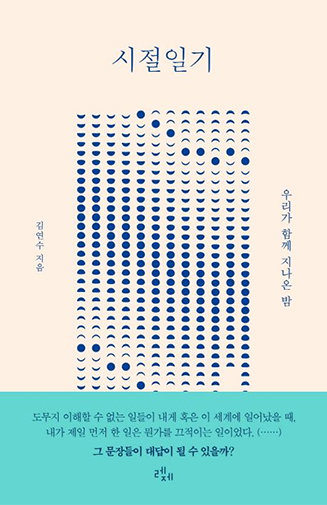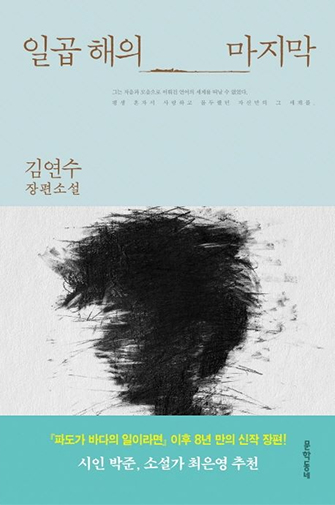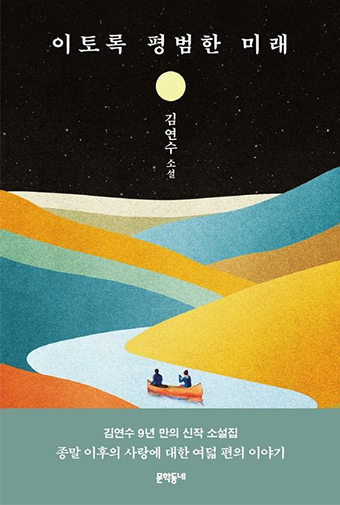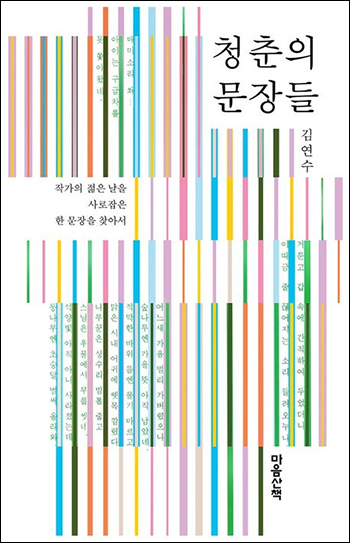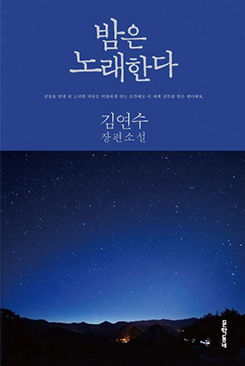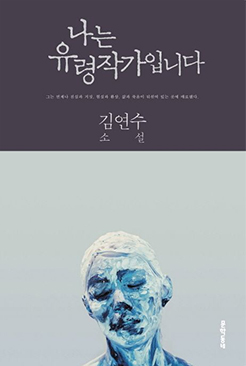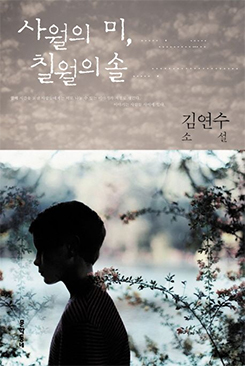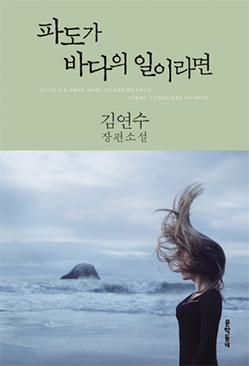|
Korean Authors
Writer Kim Yeon-Su Playing the Happiness of Every Moment
2022.12.05
We all dream of living a happy life. What is a happy life? Some might say that it is achieved through social success or economic wealth. But there’s no guarantee that they will lead to true happiness. Here’s an interview with writer Kim Yeon-Su, who writes when he is happy and wants to cherish the happiness that comes from each moment, realizing that feeling joy is more important than making success or pleasing people. Perhaps that’s why his writings always deliver positive energy to people, no matter how long – 28 years since his debut – he has been writing. Following is the story of writer Kim Yeon-Su, who writes as if he is playing an instrument with full affection toward writing.
ⓒ Channel Yes

It is an honor to have you on K-Book Trends. Please say hello to our subscribers and give a brief introduction of yourself.
Hello, it is good to see you all. I debuted in 1994 with my full-length novel Walking While Pointing to the Mask (Sekyesa). Since then, I have published many full-length novels, short stories, and essays, as many as the number of years I’ve been in my career as a writer – 28 years.

You published Such an Ordinary Future (Munhakdongne) recently. This is a short story collection published after 9 years. How does it feel to be meeting readers through the book?
I believe that the true value of novels derives from a good coordination of inner desire and the external environment. I have had some time to look back at myself, as I couldn’t catch up with the speed of change in society. Then, with the COVID-19 outbreak, I have seen people around the world change their lifestyles with no other choice. Only then did I have the desire to create new stories. Perhaps it was the desire to communicate with people who lived in modern times like me. I think it's a good thing that my stories about changes since the pandemic can come together as a book. I believe there is still time to change our lives and the world in a better direction. I look forward to hearing other thoughts from readers after reading my book.
I had the desire to make new stories as COVID-19 spread across the world.

You said you had a “strong internal desire to change” until right before you published your latest book. What made you think so? Also, please tell us how your “new attitude” is reflected in the book.
Watching my parents die naturally reminded me of the end of life. I realized that I hadn’t really thought about it at all in my entire life. I just had the belief that, if I lived my life to the fullest by pursuing the so-called “social success,” there would be a good end. But then, one question came to my mind – is chasing success, giving up on the things I love right now, the best life possible? Can that success be called true success?
A Diary of Days, The Last of Seven Days, and Such an Ordinary Future

Which book of yours do you think represents you the best? And why do you think so?
I think A Diary of Days (Leger), The Last of Seven Years (Munhakdongne), and Such an Ordinary Future are the best representations of myself today. These three books influenced me in sequence. The book A Diary of Days encouraged me to write The Last of Seven Days, and the two books ultimately led me to write Such an Ordinary Future. The entire process of writing these books was a journey for me to find my own voice.

In July, the revised edition of The Writings Written in My Youth (Maumsanchaek) was published, which was initially released in 2004. It must have been a refreshing moment for you as you face the book you wrote 20 years ago. What did you particularly focus on as you worked on the revision?
I first thought of letting the book go out of print as I thought it no longer had the value to be read as time went by. But, as I read through the book once again, things became new. It was time that made it so. Over time, the events of twenty years ago have become completely new. Time makes things rise and fall. It also makes grief the seed of happiness, and chance the seed of failure. It’s the magic of time. And, upon learning this, I could see the time ahead of me in detail, and I realized what to focus on and what not to do. The pain I have right now might be a necessary ingredient for me to achieve what I want. And, from that point of view, I was able to be thankful for the unexpected chance and learned not to be obsessed with it. As these realizations came during my revision work, I wanted to deliver them to my young readers.
The Writings Written in My Youth

What is the most important element when you write novels? Is there a particular part you pay attention to the most?
What's more important is how I feel when I write novels. I must be in a good mood. There's no point in writing when I'm obviously not feeling so good, but before that, I can't just hold a pen. I write when there’s something I want to write about. If I want to continue writing after scribbling, that means I'm in the mood to write. In that case, I continue to write all the way. Of course, difficult times come even when I'm writing in a great mood. But it is just that. I’m not in pain. This is the key. It would be better to put the pen down when you are in distress, since there is no chance that the condition leads to a good novel.
Writings written in a good mood lead to good novels.

You said the act of writing something is the beginning of writing a novel. From your experience, what kind of writing usually leads to novels?
I think with my fingers. I enjoy typing. I sometimes become a pianist or a keyboardist when I type. I particularly like the sound it makes. So, I tend to type on the keyboard, randomly, even if there’s nothing to write about. Yes, that means I’m always writing something. Sometimes it's a complete sentence, and sometimes it's ridiculous self-talk. Well, it doesn't matter – I can listen to the sound of the keyboard. When I have nothing to type, I write stuff I wrote in the past. I sometimes copy them, and sometimes fix some parts. Sometimes a story abruptly begins as I do so, and from what I’ve experienced, it becomes a novel. The short stories, too, if I rewrite them several times, they become full fiction.

You have also written novels based on historical facts, such as The Night is Singing (Munhakdongne) and I’m a Ghost Writer (Munhakdongne). Are you interested in history? What made you add historical elements to your novels?
When you are swallowed up in your own troubles, you come to think that pain is unique to you. But history has long held that this is wrong. In the course of history, all adults worried about immature young people. As well, there are so many stories of people who have lost loved ones and have had to spend the rest of their lives without them. But, when you realize that pain and grief are not unique to yourself and everyone is experiencing the same thing, your mind will grow even greater. I think it's hard to understand your life without reference to the long history of humanity.
The Night is Singing, I’m a Ghost Writer, Mi of April, Sol of July, and If the Waves Belong to the Sea

Your books, such as Mi of April, Sol of July (Munhakdongne), and If the Waves Belong to the Sea (Munhakdongne), were published in other countries, meeting readers across the world. While there’s less chance to meet your readers face-to-face due to the pandemic, what do you want to talk about with them through your books?
I think the pandemic has made every citizen of the world experience the same thing. It allowed us to understand one another across borders. So, I hope to talk with people from around the world about how it is going to change us and our world.

You have been continuously writing prose collections as well. What would it be – a prose collection or novel – for your next work? Please tell us about your future plans or goals.
After deciding to do more things I love, I decided to write only when there is something I want to write. These days, I want to write novels more than essays. So, my next work is going to be a collection of short stories. Then, I’m thinking of writing a full-length novel featuring the Imjin War.
#Kim Yeon-Su#Novelist#Such an Ordinary Future#COVID-19#The Writings Written in My Youth |
Pre Megazine
-

Jakkajungsin Publishing Co.
VOL.69
2024.04 -

Writer Yun Jung-Eun
VOL.69
2024.04 -

Jumping Books Publishing House
VOL.68
2024.03 -

Writer Kim Hwa-Jin
VOL.68
2024.03 -

Publisher Hyohyung
VOL.67
2024.02 -

Writer Minha
VOL.67
2024.02 -

Almond Publishing
VOL.66
2024.01 -

Writer Kwon Jung-Min
VOL.66
2024.01 -

Hakgojae Publishers
VOL.65
2023.12 -

Writer Kim Hye-Jung
VOL.65
2023.12 -

Eidos Publishing House
VOL.64
2023.11 -

Writer Hwang In-Chan
VOL.64
2023.11 -

Munhakdongne
VOL.63
2023.10 -

Writer Chang Kang-myoung
VOL.63
2023.10 -

Happywell Publishing
VOL.62
2023.09 -

Writer Baik Soulinne
VOL.62
2023.09 -

Dasan Contents Group (Dasan Books)
VOL.61
2023.08 -

Writer Lim Kyoung-Sun
VOL.61
2023.08 -

SpringSunshine Publishing Co.
VOL.60
2023.07 -

Writer Lee Kyung-Hye
VOL.60
2023.07 -

Human Cube
VOL.59
2023.06 -

Doctor Jeong Jae-Seung
VOL.59
2023.06 -

Anonbooks
VOL.58
2023.05 -

Writer Son Bo-Mi
VOL.58
2023.05 -

Namhaebomnal
VOL.57
2023.04 -

Writer Kim Bo-Young
VOL.57
2023.04 -

Hugo Publishing
VOL.56
2023.03 -

Writer Cho Kwang-Hee
VOL.56
2023.03 -

Balgeunmirae Publishing Co.
VOL.55
2023.02 -

Writer Lee Byung-Ryul
VOL.55
2023.02 -

Wisdom House, Inc
VOL.54
2023.01 -

Writer Jeong Jia
VOL.54
2023.01 -

Humanitas
VOL.53
2022.12 -

Writer Kim Yeon-Su
VOL.53
2022.12 -

Songsongbooks
VOL.52
2022.11 -

Writer Eun Hee-Kyung
VOL.52
2022.11 -

Bombom Publishing Co.
VOL.51
2022.10 -

Writer Jiwon Yu
VOL.51
2022.10 -

Hangilsa Publishing Co., Ltd.
VOL.50
2022.09 -

Writer Kim Won-Young
VOL.50
2022.09 -

Moksu Publishing Company
VOL.49
2022.08 -

Writer Yoo Sun-Kyong
VOL.49
2022.08 -

Next Wave
VOL.48
2022.07 -

Writer Park Sang-Young
VOL.48
2022.07 -

A Thousand Hopes
VOL.47
2022.06 -

Writer Bora Chung
VOL.47
2022.06 -

Woongjin ThinkBig
VOL.46
2022.05 -

Dr. Oh Eun-Young
VOL.46
2022.05 -

JECHEOLSO Publishing House
VOL.45
2022.04 -

Writer Jang Ryu-Jin
VOL.45
2022.04 -

Changbi Publishers
VOL.44
2022.03 -

Writer Kim Ho-Yeon
VOL.44
2022.03 -

Mati Books
VOL.43
2022.02 -

Writer Lee Kkoch-Nim
VOL.43
2022.02 -

Picturebook Gongjackso
VOL.42
2022.01 -

Writer Kim Sang-Wook
VOL.42
2022.01 -

Writer So-yeon Park
VOL.42
2022.01 -

Writer Yoo Eun sil
VOL.42
2022.01 -

Kungree Press
VOL.41
2021.12 -

Writer Kim Lily
VOL.41
2021.12 -

Writer Park Yeon-jun
VOL.41
2021.12 -

Writer Yi Hyeon
VOL.41
2021.12 -

A deeper world told through picture books 'Iyagikot Publishing (Story Flower)'
VOL.12
2019.06 -

Author Jeon Min-hee
VOL.12
2019.06 -

Illustrator Kim Hwan-Young
VOL.13
2019.07 -

Travelers sailing through the sea of knowledge - 'Across Publishing Group Inc.'
VOL.13
2019.07 -

Genre Novel Publisher 'Arzak Livres'
VOL.14
2019.08 -

Author Lee Yong-han
VOL.14
2019.08 -

Wookwan Sunim
VOL.15
2019.09 -

East-Asia Publishing
VOL.15
2019.09 -

Author Jo Jung-rae
VOL.16
2019.10 -

EunHaeng NaMu Publishing
VOL.16
2019.10 -

Writer Heo Kyo bum
VOL.40
2021.11 -

Writer Kim So-Young
VOL.40
2021.11 -

Author-illustrator Kim Sang Keun
VOL.40
2021.11 -

ACHIMDAL BOOKS
VOL.40
2021.11 -

Author Kang Gyeong-su
VOL.17
2019.11 -

Moonji Publishing Belongs to the Literary Community
VOL.17
2019.11 -

Author Kim Yun-jeong
VOL.18
2019.12 -

I-Seum
VOL.18
2019.12 -

Kim Cho-Yeop
VOL.19
2020.02 -

Creating a window into the future with books
VOL.19
2020.02 -

Author Serang Chung
VOL.20
2020.03 -

Hey Uhm
VOL.20
2020.03 -

Writer Lim Hong-Tek
VOL.21
2020.04 -

BIR
VOL.21
2020.04 -

Writer Song Mikyoung
VOL.39
2021.10 -

Author-illustrator Kim Dong Su
VOL.39
2021.10 -

Writer Lee Seula
VOL.39
2021.10 -

Tabi Books
VOL.39
2021.10 -

Writer Kim Soo-hyun
VOL.38
2021.09 -

Author-illustrator Lee Myoung Ae
VOL.38
2021.09 -

Writer Hwang Sunmi
VOL.38
2021.09 -

Kidari Publishing Co.
VOL.38
2021.09 -

Writer Sohn Won-Pyung
VOL.22
2020.05 -

Woods of Mind's Books
VOL.22
2020.05 -

Writer Heungeul
VOL.23
2020.06 -

Gloyeon
VOL.23
2020.06 -

Maumsanchaek
VOL.24
2020.07 -

Winners of the 2021 Bologna Ragazzi Award
VOL.37
2021.08 -

Picture book artist Lee Suzy
VOL.37
2021.08 -

Author-illustrator Yi Gee Eun
VOL.37
2021.08 -

Hubble
VOL.37
2021.08 -

Writer Baek Se-Hee
VOL.25
2020.08 -

Bearbooks Inc.
VOL.25
2020.08 -

Author Baek Hee-Na
VOL.26
2020.09 -

Yuksabipyoungsa
VOL.26
2020.09 -

Writer Kang Hwa-Gil
VOL.27
2020.10 -

Kinderland (Bandal)
VOL.27
2020.10 -

Writer Ha wann
VOL.36
2021.07 -

Author-illustrator Myung Soojung
VOL.36
2021.07 -

Writer Jung Yeo-Wool
VOL.36
2021.07 -

Publisher EcoLivres
VOL.36
2021.07 -

Writer Lee Geumi
VOL.28
2020.11 -

Sakyejul
VOL.28
2020.11 -

Writer Kim Keum-Hee
VOL.29
2020.12 -

Geulhangari
VOL.29
2020.12 -

Writer Cheon Seon-Ran
VOL.30
2021.01 -

Hyang Publishing House
VOL.30
2021.01 -

Writer Lee Hee-Young
VOL.31
2021.02 -

Sanzini
VOL.31
2021.02 -

Publisher Prunsoop
VOL.32
2021.03 -

Writer Sim Yun-Kyung
VOL.32
2021.03 -

Hanbit Media
VOL.35
2021.06 -

Hyeonamsa
VOL.33
2021.04 -

Author-illustrator Noh Inkyung
VOL.33
2021.04 -

Writer Cho Won-Jae
VOL.35
2021.06 -

Writer Kim Jung-Mi
VOL.34
2021.05 -

Safehouse Inc.
VOL.34
2021.05


